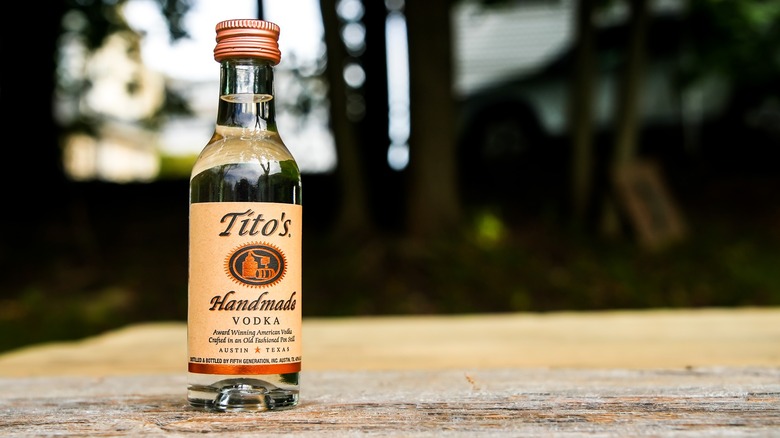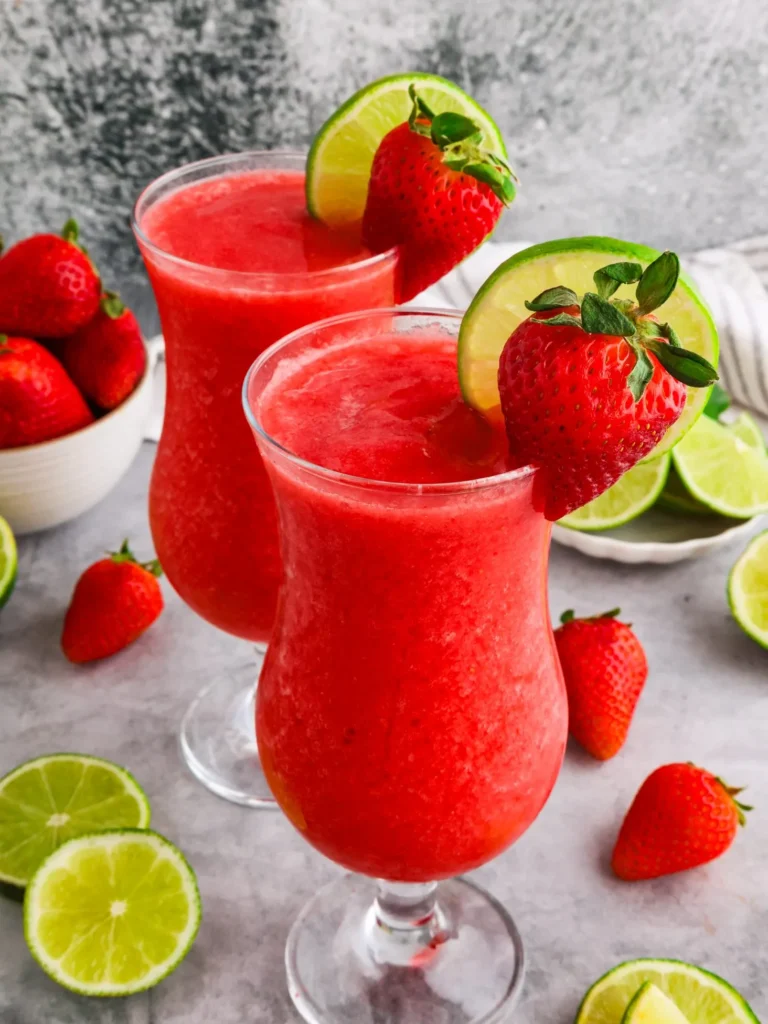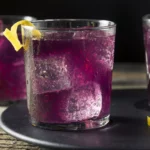Ever thrown a bottle of vodka in the freezer to get it extra cold for a party? But does vodka actually freeze? You might be surprised to learn that vodka, unlike water, won’t actually freeze solid in your typical home freezer. This might be surprising, but there’s a scientific reason behind it.
Key Takeaways:
- Vodka won’t freeze solid in your typical home freezer because its freezing point is much lower than water’s. Due to the high alcohol content (around 40%), vodka freezes at a much colder temperature, around -27°C (-16°F). This is significantly colder than most home freezers which average around -18°C (-0.4°F).
- Higher proof (more alcohol) in vodka means a much colder temperature is needed for it to freeze.
- Freezing vodka won’t make it stronger.
- Opened vodka should be kept in the fridge to avoid flavor loss.
- Freezing vodka can numb its subtle flavors, while refrigerating keeps it pleasantly chilled and preserves those taste nuances.
The Science Behind Freezing Vodka
We discovered that vodka stays liquid in the freezer, unlike water. This has a scientific explanation related to the way alcohol molecules behave. Here’s a breakdown:
1. The Power of Freezing Point Depression
Ethanol, the main alcoholic component of vodka, plays a crucial role in its resistance to freezing. Pure ethanol boasts a remarkably low freezing point of around -114°C (-173°F). This is significantly lower than the 0°C (32°F) freezing point of water.
Here’s the key concept: freezing point depression. When a solution is formed by dissolving a substance (like ethanol) in a solvent (like water), the freezing point of the resulting mixture is lowered compared to the pure solvent. In vodka, ethanol acts as the solute, lowering the freezing point of the water-ethanol mixture.
2. The Vodka Equation: Balancing Alcohol and Water
Commercial vodka isn’t pure ethanol. It’s a carefully crafted blend, typically containing around 40% alcohol by volume. The remaining 60% is primarily water, with trace amounts of flavorings or impurities depending on the brand.
This dilution is crucial. While pure ethanol has a very low freezing point, adding water raises the freezing point of the mixture. However, with 40% alcohol content, the freezing point of vodka remains significantly lower than a standard home freezer, which typically operates around -18°C (-0.4°F).
The key to understanding why vodka doesn’t freeze lies in comparing its freezing point to the temperature of your freezer. As mentioned earlier, vodka with 40% alcohol content might have a freezing point around -27°C (-16°F). Since most freezers are colder than -18°C but not quite as cold as -27°C, the vodka mixture won’t reach the necessary temperature for solidification.
Freezing Points of Vodka by Proof
The amount of alcohol in vodka, measured in proof, significantly impacts its freezing point. Here’s a table summarizing the freezing points of vodka at different proof levels:
| Proof | Alcohol by Volume (ABV) | Freezing Point (Fahrenheit) | Freezing Point (Celsius) |
|---|---|---|---|
| 40 | 20% | -15°F | -26°C |
| 75 | 37.5% | -31°F | -35°C |
| 90 | 45% | -45°F | -43°C |
| 100 | 50% | -57°F | -49°C |
As the proof (and ABV) of vodka increases, the freezing point decreases. This means higher proof vodka requires a much colder temperature to freeze compared to lower proof vodka.
Can You Freeze Vodka in a Home Freezer?
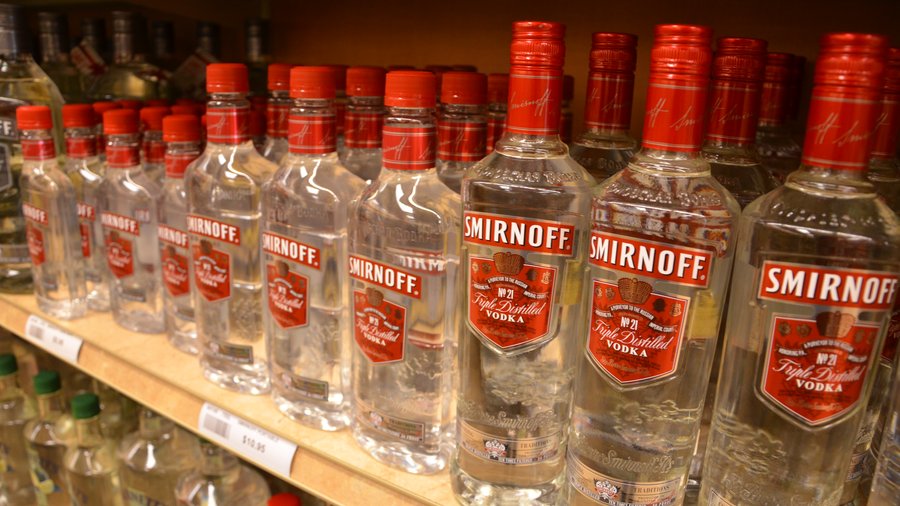
While the science behind freezing points might seem complex, the answer to this question is quite simple: No, vodka typically won’t freeze in your home freezer.
Here’s why vodka does not freeze in the freezer:
1. Home Freezer Temperatures
Most home freezers are set to a temperature range between 0°F (-18°C) and -5°F (-20°C). This is colder than the freezing point of water (32°F or 0°C) but not cold enough to freeze most vodka.
2. Impact of Proof
As I told you in previous section, vodka’s freezing point gets lower with increasing proof (alcohol content). Referring to the table:
- Standard vodka (40 proof) has a freezing point of around -15°F (-26°C).
- Even higher proof vodkas (75 proof to 100 proof) have even lower freezing points, ranging from -31°F (-35°C) to -57°F (-49°C).
Therefore, since most home freezers operate at warmer temperatures than the freezing points of various vodka proofs, your vodka will likely just get extra chilled and remain liquid, perfect for serving in frosty cocktails.
Some vodka cocktails that you can try:
Freezer Fluctuations: It’s important to note that home freezer temperatures can fluctuate slightly, especially when the door is opened and closed frequently. While these fluctuations are unlikely to cause your vodka to freeze completely, they might cause some slush formation at the edges, especially for higher proof vodkas closer to their freezing point.
Exceptions: When Vodka Might Freeze
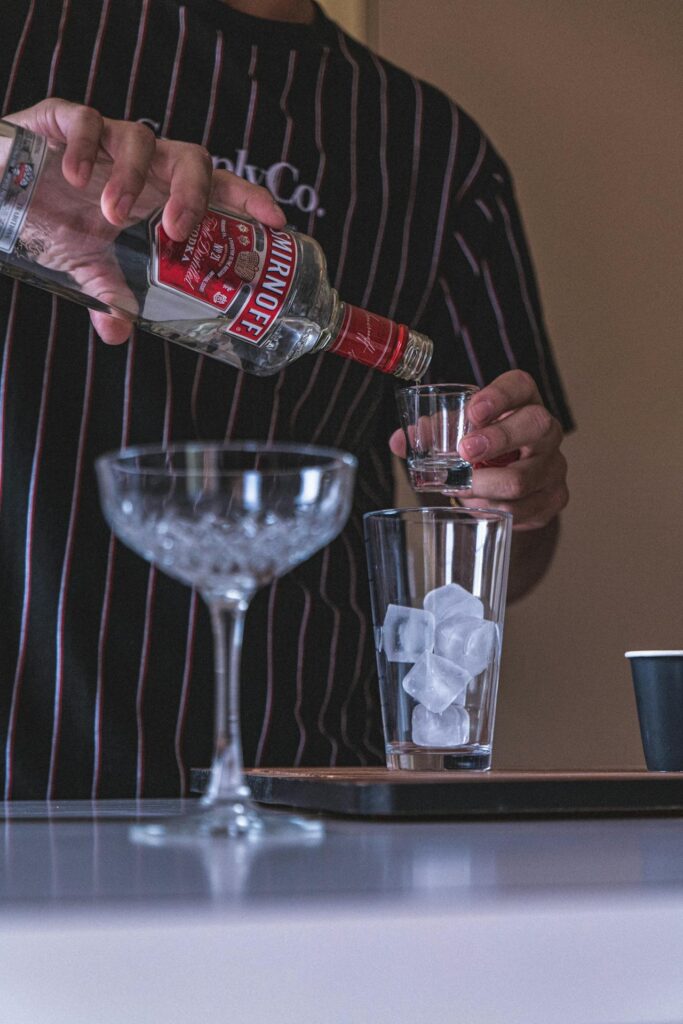
Now some people might wonder why did my vodka freeze, so let me tell you some exceptions.
While your home freezer won’t turn your vodka into a solid block, there are a couple of extreme scenarios where it might:
1. Industrial Freezers
Unlike home freezers, industrial freezers can reach much colder temperatures, often well below -50°F (-45°C). These temperatures are easily cold enough to freeze even high-proof vodkas.
Industrial freezers are used in research labs, food processing facilities, and other places where extremely low temperatures are needed.
2. Liquid Nitrogen
If you’re feeling particularly adventurous (and have access to some serious scientific equipment), liquid nitrogen can freeze anything, including vodka.
With a boiling point of -320°F (-196°C), liquid nitrogen is incredibly cold and can instantly freeze any liquid it comes into contact with.
However, it’s important to note that handling liquid nitrogen requires specialized training and safety precautions due to its extreme coldness.
Does Freezing Affect Vodka Quality?
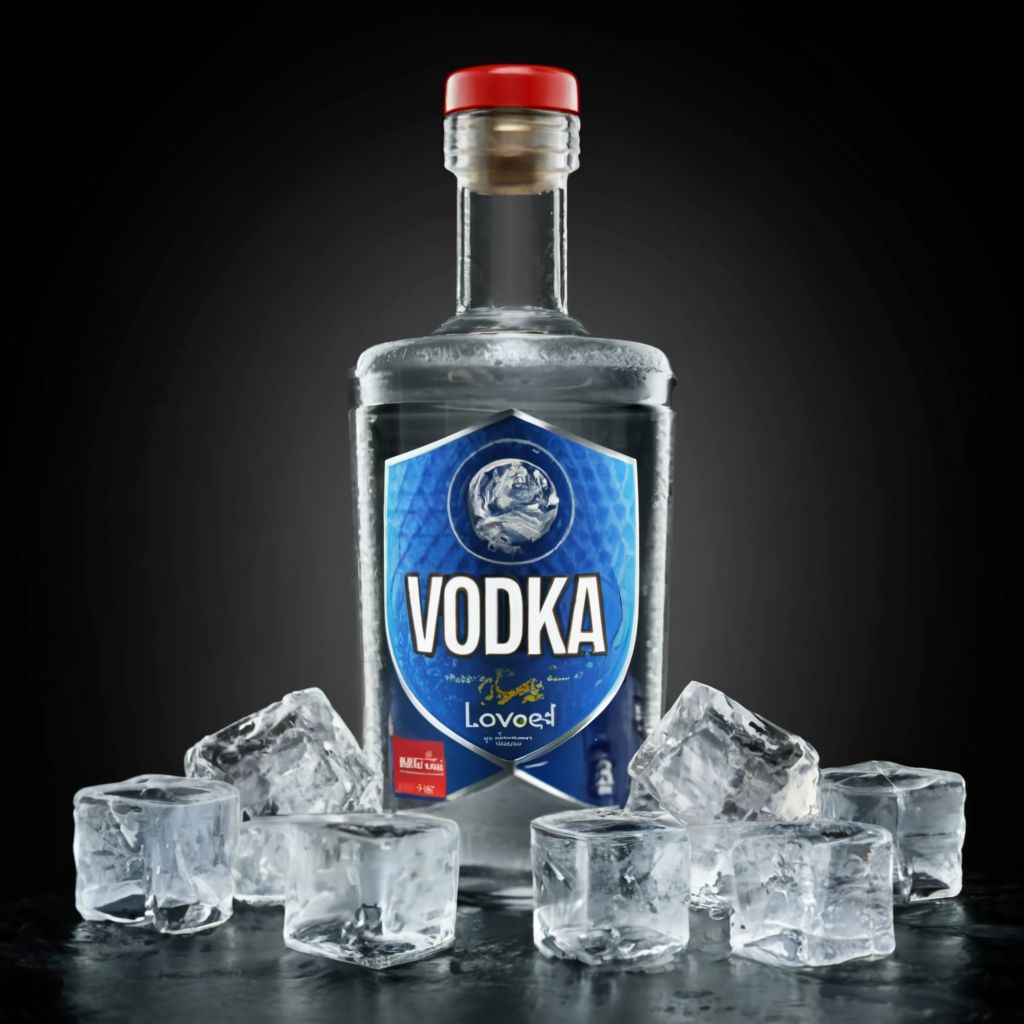
While freezing won’t solidify your vodka, it can actually have a negative impact on its taste and aroma, especially for higher-quality vodkas. Here’s why:
Subtle Flavors and Aromas: Premium vodkas are often distilled and filtered to achieve a smooth taste and distinct, subtle aromas. Freezing temperatures can dull these delicate flavors and aromas, making the vodka taste harsher and less enjoyable.
Chill is Key: The ideal temperature for storing vodka is around room temperature (around 70°F or 21°C) or slightly chilled (around 50°F or 10°C). This allows the vodka to retain its full flavor profile.
For optimal vodka enjoyment, aim to chill your vodka in the refrigerator for a short time before serving, rather than freezing it. This will ensure a refreshing drink without compromising the taste and aroma of your favorite vodka, especially for high-quality varieties.
Read: Do energy drinks explode when you freeze them
Should you freeze or refrigerate vodka?
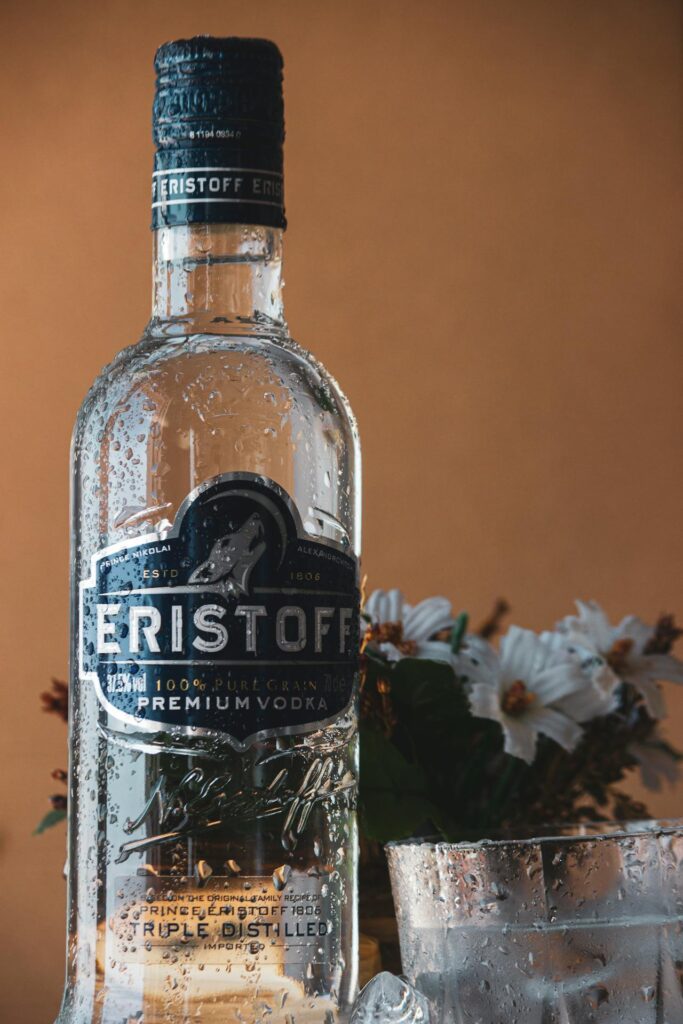
For the best vodka experience, refrigeration is generally preferable to freezing.
Refrigerating vodka
Opened bottles of vodka are best stored in the refrigerator (around 4°C or 39°F). Refrigeration helps to slow down any potential evaporation of alcohol and preserve the flavor profile. If you plan on serving the vodka chilled, storing it in the fridge ensures it’s ready to enjoy.
Refrigeration is a safe and effective way to store opened vodka. It’s not necessary for unopened bottles. Unopened bottles can be stored at room temperature in a cool, dark place.
Freezing Vodka
While some people believe freezing is necessary, it’s not essential and can even be counterproductive:
- Freezing doesn’t improve the taste or quality of vodka.
- In fact, for high-quality vodkas with subtle flavors, extreme cold can numb those characteristics.
Here’s the science: Vodka’s alcohol content (typically 40%) lowers its freezing point compared to water. Most home freezers aren’t cold enough to freeze vodka completely. However, the vodka will get very cold and possibly thicker.
So, should you freeze vodka? It’s not recommended for optimal taste, especially for premium brands. However, if you prefer your vodka very cold, a quick chill in the freezer for a short period before serving is acceptable.
Vodka Storage: Fridge vs. Freezer
| Feature | Fridge | Freezer |
|---|---|---|
| Flavor | Preserves taste (premium vodka) | Dulls taste |
| Chilling | Sufficient for most drinks | Very cold (quick chill) |
| Evaporation | Slows down evaporation | Not a major benefit |
| Convenience | Ready to use | Needs thawing |
| Unopened Bottles | Not necessary | Not recommended |
Conclusion: The Cool Truth About Freezing Vodka
So, the next time you reach for a bottle of vodka to chill for a party, you can skip the freezer! Here’s a quick recap:
- Proof Matters: The higher the proof (alcohol content) of vodka, the lower the temperature needed for it to freeze.
- Home Freezers Not Cold Enough: Standard home freezers typically operate at temperatures that won’t freeze most vodka due to its alcohol content.
- Chill, Don’t Freeze: Freezing can dull the delicate flavors and aromas of vodka, especially in higher-quality varieties.
Did you know that some cultures actually enjoy vodka served slightly warm? In Russia and Poland, for example, vodka is sometimes served at room temperature to better appreciate its subtle flavors and aromas.
FAQS
At what temp does vodka freeze?
The exact temperature at which vodka freezes depends on its alcohol content. The higher the alcohol content (percentage of ethanol), the lower the freezing point of the vodka. Pure ethanol freezes at a very low -114°C (-173°F). Vodka is a mixture of ethanol and water. Water freezes at 0°C (32°F). As the water content increases, the freezing point of the vodka rises.
Standard Vodka:
- Most vodkas are around 40% alcohol by volume (80-proof).
- With this concentration, the freezing point of vodka is likely around -27°C (-16°F).
Therefore, a standard home freezer (around -18°C/-0.4°F) isn’t cold enough to freeze most vodka. It will get very cold and possibly thicker, but it won’t solidify. Also check out some best non grain vodkas for acid reflux and stomach problems.
Does 80 proof vodka freeze?
No, 80-proof vodka most likely won’t freeze in your standard home freezer. Here’s why:
- Proof and Alcohol Percentage: Proof is a unit used in the US to denote the alcohol content of a beverage, equal to twice the percentage of alcohol by volume. So, 80-proof vodka is 40% alcohol (80 / 2 = 40).
- Freezing Point of Alcohol: Pure ethanol, the alcohol in vodka, has a very low freezing point of around -114°C (-173°F).
- Impact of Dilution: Vodka isn’t pure alcohol; it’s a mixture of ethanol and water. While water freezes at 0°C (32°F), adding water to alcohol increases the freezing point of the mixture.
- Freezer Temperatures vs. Vodka’s Freezing Point: Most home freezers maintain temperatures around -18°C (-0.4°F).
With 40% alcohol, 80-proof vodka’s freezing point is likely around -27°C (-16°F). Because a typical home freezer isn’t cold enough to reach this threshold, the vodka will get very cold but won’t solidify.
How long does 80 proof vodka freeze?
80-proof vodka actually won’t freeze in a standard home freezer, regardless of how long you leave it there. Because 80-proof vodka’s freezing point is likely around -27°C (-16°F), it remains liquid in a freezer that’s not cold enough to reach that threshold. Even after extended periods, the vodka will get very chilled and possibly more viscous, but it won’t solidify.
What temperature does 100 proof vodka freeze?
With 50% alcohol content, 100-proof vodka’s freezing point is likely somewhere around -32°C (-25.6°F). This is still significantly colder than the temperature of a typical home freezer. Therefore, the vodka will get very cold but won’t solidify no matter how long you leave it there.
While a home freezer won’t freeze 100-proof vodka, industrial freezers or liquid nitrogen can reach temperatures low enough to cause it to solidify. However, this isn’t a situation you’d encounter in everyday life.
Will 35% vodka freeze?
No, 35% vodka most likely won’t freeze in your standard home freezer. Vodka isn’t pure alcohol. With 35% alcohol, the remaining 65% is primarily water, which freezes at 0°C (32°F). Adding water raises the freezing point of the mixture compared to pure ethanol.
Since the freezing point of 35% vodka is likely colder than -18°C (the temperature of most freezers), it won’t reach the necessary temperature to solidify. The vodka will get very cold in the freezer, possibly thicker due to the increased viscosity, but it won’t freeze solid.
Does freezing vodka ruin it?
Freezing vodka itself doesn’t ruin it in terms of safety. It won’t develop harmful properties or become toxic. However, freezing can affect how you experience the vodka’s taste.
If you want to savor the full complexity of a good vodka, aim for a temperature between 32-39°F (0-4°C). This can be achieved by storing it in the refrigerator or chilling it with ice shortly before serving.
Does Grey Goose vodka freeze?
No, Grey Goose vodka, or any vodka for that matter, likely won’t freeze in your standard home freezer. Pure ethanol has a very low freezing point, around -114°C (-173°F). However, vodka isn’t pure alcohol.
Grey Goose, like most vodkas, is around 40% alcohol by volume. The remaining 60% is primarily water, which freezes at 0°C (32°F). Adding water raises the freezing point of the mixture compared to pure ethanol. And most home freezers typically operate around -18°C (-0.4°F).
While the exact freezing point of Grey Goose depends on any trace ingredients, it’s likely around -27°C (-16°F) due to the 40% alcohol content. Since most freezers aren’t cold enough to reach this threshold, the vodka won’t freeze.
While freezing won’t harm the vodka, they recommend chilling it rather than freezing it to experience the full range of flavors. This is especially true for premium vodkas like Grey Goose.
Why does vodka get thicker in the freezer?
Even though vodka won’t freeze solid in your freezer, it does get noticeably thicker. This is because of two things: cold and how vodka is mixed.
As it gets colder, the tiny particles in vodka slow down, making it flow less easily, similar to how honey gets thicker in the cold. Also, vodka is mostly water with some alcohol.
When chilled, some water forms tiny ice crystals that get trapped between the alcohol molecules, making the whole thing a bit thicker.
Think of it like a crowded room – when it gets cold, people move slower and some might huddle together, making it harder to move around freely. This thickening doesn’t affect the taste much, and some people even prefer the slightly thicker texture in cocktails.
Why do Russians put vodka in freezer?
Traditionally, Russians don’t necessarily put vodka in the freezer. They tend to store it chilled in the refrigerator, around 32-39°F (0-4°C). This is because they often drink vodka neat (without mixers) and want to enjoy the subtle flavors and aromas of a good vodka. Extreme cold can actually numb these characteristics.
However, there can be exceptions. Some Russians might put vodka in the freezer for a quick chill before serving, especially if they don’t have time to refrigerate it beforehand. Additionally, lower-quality vodkas with harsh flavors might benefit from being served very cold, as the numbing effect can mask those unpleasant aspects.
Why do Americans put vodka in freezer?
There are a few reasons why Americans might put vodka in the freezer:
- Habit: It’s a common misconception that vodka needs to be freezing cold to be enjoyable. This perception might be influenced by movies or pop culture portrayals.
- Smoother Taste: Similar to Russians with lower-quality vodka, some Americans might find the numbing effect of very cold vodka makes it smoother to drink, especially in mixed drinks.
- Quick Chill: Like Russians, Americans might use the freezer for a quick chill before serving, particularly if they haven’t had time to refrigerate the vodka beforehand.
It’s important to note that for premium vodkas with nuanced flavors, freezing can be detrimental to the tasting experience.
Will vodka get slushy in the freezer?
No, vodka won’t get slushy in your standard home freezer. Because of the alcohol content, the freezing point of most vodka is likely around -27°C (-16°F). This is colder than the temperature of a typical home freezer. So, the vodka will get very cold and possibly thicker, but it won’t freeze solid or become slushy.
Is vodka the only alcohol that doesn’t freeze?
No, vodka isn’t the only freeze-resister. High-proof spirits like rum, tequila, gin, whiskey (depending on proof), and even cognacs like Hennessy do not freeze thanks to their high alcohol content (ethanol, which freezes at a very low -114°C/-173°F).
However, lower-alcohol beverages like beers and wines, or some liqueurs, can freeze in your home freezer because the higher water content raises the freezing point of the mixture.
What Happens When You Put Vodka in the Fridge?
Nothing negative happens to the vodka. It simply gets colder, typically around 4°C (39°F). This temperature is ideal for preserving the flavor profile and keeping it conveniently chilled for use in cocktails or straight up.
Does Tito’s vodka need to be refrigerated?
Refrigeration isn’t mandatory for unopened bottles of Tito’s vodka, or any vodka for that matter. Unopened bottles stored at room temperature (around 20°C or 68°F) will maintain their quality for a long time. But, for opened bottles and to maximize flavor preservation, refrigeration is recommended.
Is Frozen Vodka Stronger?
No, freezing vodka does not make it stronger. Even though some water freezes as ice, the total amount of alcohol in the vodka stays the same. It’s simply in a colder state with some ice crystals.
Once thawed, the vodka will still have its original alcohol content (typically 40% for vodka). So, frozen vodka isn’t stronger in terms of alcohol content.
Does Absolut Vodka Freeze?
Absolut vodka, like most vodkas, will not freeze in your standard home freezer. Here’s why:
Similar to Tito’s, Absolut vodka contains a high amount of alcohol (usually around 40% alcohol by volume). This lowers the overall freezing point of the mixture compared to pure water. Most home freezers maintain temperatures around -18°C (-0.4°F).
Due to its alcohol content, Absolut vodka’s freezing point is likely around -27°C (-16°F). This is colder than the temperature of a typical home freezer. As a result, Absolut vodka will get very cold and possibly thicker in the freezer, but it won’t freeze solid.
Absolut vodka won’t freeze in your standard home freezer due to its alcohol content.
Can you put Smirnoff vodka in the fridge?
Yes, you can absolutely put Smirnoff vodka in the fridge! In fact, refrigeration is the recommended storage method for opened bottles of Smirnoff, or any vodka for that matter.
How Long Does Opened Vodka Last in the Fridge?
Under refrigeration, opened vodka can last for a very long time, potentially years. However, the quality might start to decline slightly after a year or two. This is due to the slow evaporation of alcohol and the potential for subtle flavor changes.
Can you freeze vodka into ice cubes?
Unfortunately, vodka won’t freeze solid enough for ice cubes in your home freezer. However, it’s still not low enough to solidify completely in most home freezers, which typically maintain temperatures around -18°C (-0.4°F). So, the vodka will get very cold and might become thicker, but it won’t turn into solid ice cubes.
Does vodka go bad if opened and not refrigerated?
Opened vodka itself won’t necessarily go bad if not refrigerated. The high alcohol content acts as a natural preservative. However, quality can decline slightly over time.
Some alcohol evaporation can occur, especially when exposed to air. Additionally, subtle flavors and aromas in vodka might diminish slightly at room temperature. For optimal taste and quality, especially for opened bottles, refrigeration around 4°C (39°F) is recommended.
Does real vodka freeze?
Yes, real vodka can technically freeze, but your standard home freezer likely won’t get cold enough. The science behind this is the alcohol content lowering the freezing point compared to water.
While home freezers typically maintain temperatures around -18°C (-0.4°F), vodka’s alcohol content (around 40%) lowers its freezing point to around -27°C (-16°F).
Since most home freezers aren’t that cold, the vodka won’t freeze solid. So, real vodka can freeze, but it requires extremely cold temperatures.
Does freezing vodka affect the alcohol content?
No, freezing vodka does not affect its alcohol content. When vodka freezes, it doesn’t solidify uniformly. The water content freezes first as ice crystals, but the alcohol (with its much lower freezing point) stays liquid. This doesn’t mean they separate completely.
The alcohol remains mixed within the solution, like icy chunks floating in a cold drink. Throughout freezing and thawing, the total amount of alcohol stays the same. It’s simply in a colder state with some ice crystals.

